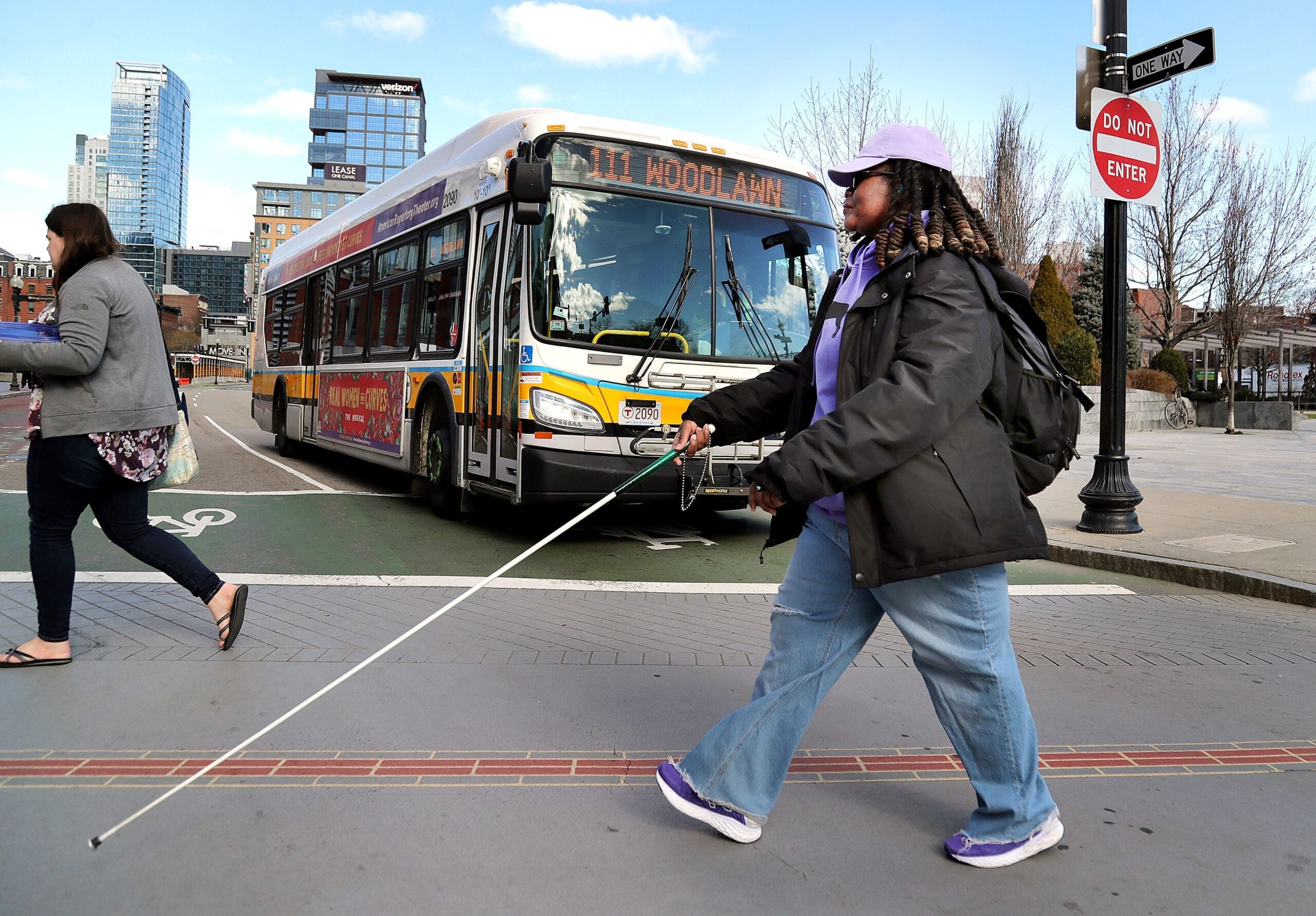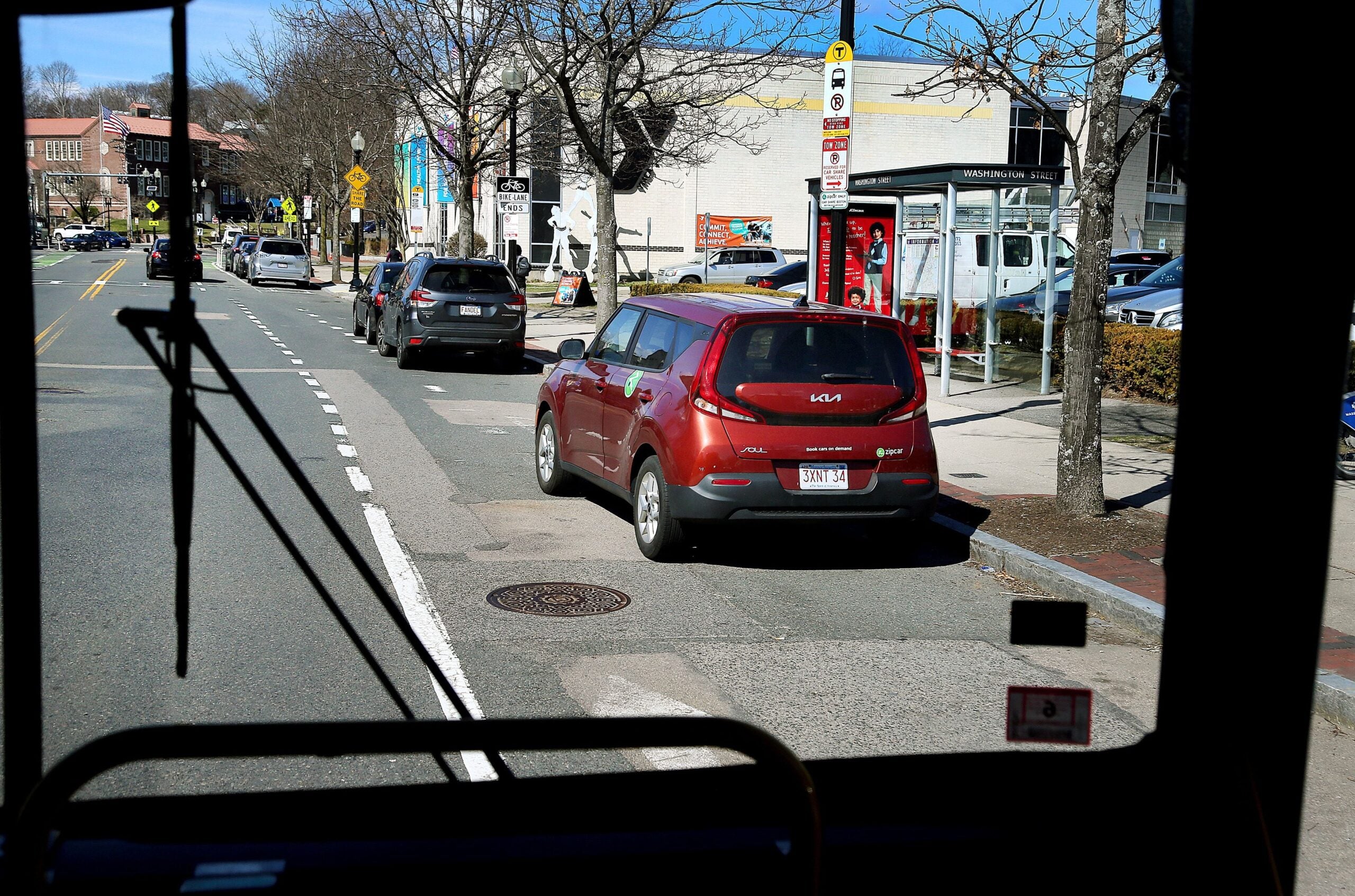In Boston, parked cars regularly block buses. Other cities show it doesn’t have to be this way.
The Boston Globe
Three drivers sat in their cars with their hazards on in a bus stop outside the Oak Square YMCA recently. The white letters spelling “BUS” painted on the asphalt beneath them and the signs warning of a $100 fine were no deterrent. Across the street, another driver, also parked in a bus stop, got out of his SUV and walked into Dunkin’ shop care-free.
All were betting — correctly — that they wouldn’t be ticketed.
In many cities, bus stops and bus lanes meant to make taking public transit faster and more reliable are kept clear of cars thanks to bus-mounted, license plate-reading cameras that allow for tickets to be sent to scofflaws by mail. But in Boston, as well as Cambridge, two of the most densely populated municipalities served by the MBTA, state law prevents delivering parking tickets via the mail.
And so, in Boston, drivers routinely park illegally, ignoring bright paint and signs denoting lanes just for buses. This doesn’t just slow down the bus, it creates unnecessary dangers for passengers, especially people with disabilities.
In Brighton, as the MBTA’s 57 bus approached the YMCA stop, the bus driver honked at the cars to no avail. Instead of pulling up to the curb, the bus doors opened in the middle lane about 10 feet away.
Casandra Xavier cautiously stepped off the bus and into the street, navigating her way to the curb with her white cane. For Xavier, 34, who is blind and deaf, the cars are not only an inconvenience, they’re a safety risk. A few years ago, in a similar situation in Harvard Square, a bicyclist hit Xavier as she was trying to get to the curb, her white cane caught in the bicycle’s spokes.
“I just really hope I don’t get hit by a car when I’m in those situations,” she said. “It’s putting people at risk really badly.”

This picture may soon change.
A bill pending in the Legislature would allow transit buses and bus stops statewide to be equipped with cameras to take photos and video snippets of parked cars and send the footage to be reviewed by a human. If validated, a ticket would get mailed to drivers with a fine as steep as $125 for parking in a bus lane and $100 for parking in a bus stop.
The technology, versions of which are already used or coming soon in New York, San Francisco, Washington D.C., Seattle, Chicago, Los Angeles, Philadelphia, and Somerville, has been proven to improve safety and bus service, currently the least reliable form of transportation provided by the T. Fines elsewhere vary. In New York, they start at $50 and increase to $250 with repeat violations.
Many Boston bus drivers, riders, and cities that have designated road space for buses say the camera technology is badly needed.
“This is about giving people who ride the bus an experience that is fast, that is reliable, that is safe, that is accessible, and that’s what this enforcement is for,” said Jascha Franklin-Hodge, Boston’s chief of streets, a role that oversees the city’s bus lanes.
In 2023, Boston’s Transportation Department issued about 8,500 $100 tickets to drivers in bus stops during the year, according to data provided by the city. That’s likely a tiny fraction of drivers who used lanes and curb space dedicated for buses.
In one week alone, in a November 2022 study, the T found hundreds of vehicles parked or traveling in bus lanes and bus stops on a 1-mile stretch of Huntington Avenue along the 39 bus route. The T estimates there were likely 1,000 violations during that time when accounting for all trips, an agency spokesperson said.
MBTA driver Kevin McDonough, who often drives the 39 bus, said he encounters blocked bus lanes and bus stops on “every trip.” He’s witnessed “numerous” passengers almost get hit by people on scooters, mopeds, and bikes while trying to get to the curb.
“We have a specific lane that’s designed just for us and we can’t use it,” he said. “We’re out here working and we’re trying our best, but there’s only so much you can do . . . Something definitely has to be done about it.”
Franklin-Hodge said the Transportation Department is hiring more staff, but even with a bigger team, they will not be able to enforce all of the bus lanes and bus stops effectively without cameras.
Other cities and states are far ahead.
The San Francisco Municipal Transportation Agency began using bus-mounted cameras for enforcement in 2008 to ticket drivers parked in bus lanes, and officials there have said the program is responsible for improving bus travel times by up to 20 percent.
Since the Metropolitan Transportation Authority in New York City began using bus-mounted cameras in 2019, officials there have called the technology a “game changer,” and credited it with improving bus speeds by 5 percent and decreasing the number of collisions by 20 percent on average. Notably, only 8 percent of ticketed drivers have received more than two violations, according to the MTA.

The technology is also taking off on a smaller scale in Massachusetts.
Somerville began using stick-mounted cameras — two at a bus stop, and one at a crosswalk — last spring to photograph drivers who park for longer than three minutes. Somerville falls under a state law that allows the city to mail parking tickets to drivers, according to Suzanne Rinfret, the city’s director of traffic and parking.
In just 67 days after the waist-high sticks were installed, they counted 469 violations, or about seven per day, The Boston Globe reported. Rinfret said she hopes to have the city’s contract with the camera stick vendor finalized and signs posted to be able to start sending tickets to drivers next month.
“We want to do this because of safety; in a perfect world we would never have a ticket in the city,” Rinfret said. “People were parking in the bus stop from three minutes to 30 minutes. People were abusing these locations.”
Cameras mounted on 10 school buses in Peabody last year found more than 850 vehicles illegally passing buses that were stopped to pick up or drop off children over five weeks. No tickets were issued to drivers as this kind of camera-enforced moving violation isn’t allowed in Massachusetts.
The bill that would allow for transit bus-mounted camera enforcement of drivers parked in bus lanes and bus stops statewide is currently in the Senate Committee on Ways and Means. Transit advocates hope the final version will allow for the cameras to be put on school buses too and allow for ticketing drivers who drive in bus-only areas, not just park in them.
A spokesperson for the American Civil Liberties Union of Massachusetts, which has expressed concern with license plate reading technology in the past, said the group is open to improved traffic enforcement using new technologies and supports the data privacy and due process protections in this bill.
“It’s gone on for a long time and it’s got to stop,” said Tom Gilbert, a T rider who is visually impaired. “Getting [legislation] passed is the moral thing to do. Not passing it is prolonging the system being inaccessible.”





